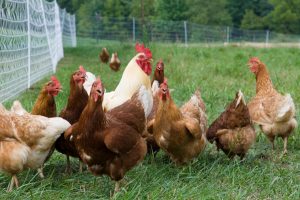
Pastured chickens | Source: http://obafarms.weebly.com/uploads/1/3/3/1/13316693/6165987_orig.jpg
Vegans raise many valid criticisms and open the door to nuanced conversations about ethical food production. While many vegans protest eating meat on a moral basis, others abstain because of unsustainable practices in meat production. For instance, on today’s cattle farms, waste food like meat and bonemeal are often mixed into grain feed for cattle, when simple hay and grass would meet their nutritional requirements more efficiently. Meanwhile, pigs are primarily fed human grade grain, when waste food is actually a more ideal form of sustenance.
However, there are some misconceptions about meat production that contribute to the idea that it is inherently problematic. Many commonly cited figures are inaccurately reported. Cattle is often blamed for the drastic rise in greenhouse gases in the atmosphere. However, when examined more closely, that rise is partly due to deforestation for logging and speculation. While meat production does contribute to at least 10% of the world’s emissions, it pales in comparison to the emissions produced by transportation. Excessive water consumption is another common objection to meat production, but the numbers are mostly exaggerated, except for the large amounts of fossil water required to grow feed for cattle in California.
Though veganism might seem like the more sustainable approach to food consumption, this isn’t taking into account the unsustainable practices currently used in industrial agriculture. It can be argued that the production of vegetable crops is nearly as problematic as meat production. For example, vegetable oils have been shown to have a wider environmental footprint than animal fat.
The question of whether or not it is ethical to eat animals is a subjective one that each person must answer on their own. As for the sustainability of meat production versus growing crops, however, the debate may not be cut-and-dried. What is clear is that there are many ways we can do better in livestock farming. By investing in better livestock farming practices, it seems it is possible to remain omnivorous and still protect the Earth.
Source: https://www.theguardian.com/commentisfree/2010/sep/06/meat-production-veganism-deforestation
